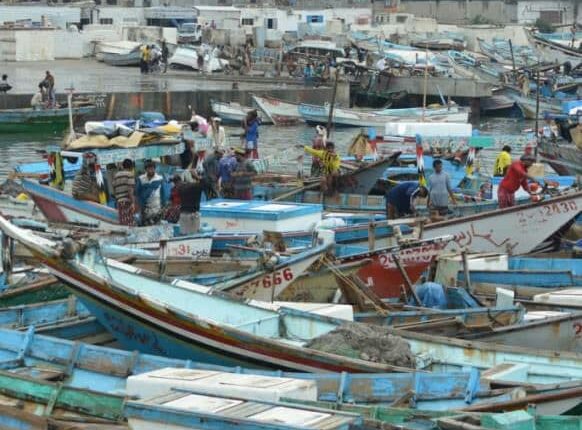SANAA, Nov. 05 (YPA) – Yemen’s marine wealth is a treasure trove of opportunities and a source of immense potential for a nation adrift in a sea of conflict, the international website Impactr reported on Wednesday.
The website affirmed in its reports that a revitalized blue economy could be a powerful engine for economic diversification, job creation, and achieving food security.
However, unlocking this potential is fraught with risks. Political instability, crumbling infrastructure, and a crippling humanitarian crisis may threaten to derail any hope for a blue economy-led recovery, the report continued.
A bright horizon location: A Sea of Opportunities
The allure of the blue economy for Yemen is undeniable. Its potential benefits are as vast as the ocean itself:
In a country overly reliant on a dwindling and conflict-ridden oil sector, the blue economy offers a vital path to diversification. By developing its fisheries, aquaculture, and marine trade, Yemen can build a more resilient and sustainable economic foundation, less vulnerable to global energy market shocks and internal conflicts.
Developing a vibrant blue economy would generate a wave of new job opportunities, from fishermen and fish farmers to port workers and those in the tourism sector. This would not only provide a lifeline for thousands of families but also help address rampant unemployment, which fuels social unrest and instability.
The report stated that in a country where hunger is a daily reality, the blue economy offers a tangible solution. By sustainably managing its fisheries and developing a thriving aquaculture sector, Yemen can significantly boost its domestic food production, providing a sustainable, self-sufficient solution to a devastating humanitarian crisis.
The blue economy is not just about exploitation; it’s about good governance. By adopting its principles, Yemen will commit to the sustainable management of its marine resources, protecting them from the scourges of overfishing, pollution, and habitat destruction. This is not merely an environmental imperative; it is a promise to future generations to preserve their natural heritage.
Additionally, a thriving blue economy could be Yemen’s ticket back to regional and global prominence. By revitalizing its maritime sector, Yemen can reassert its position as a key player in the Red Sea and the Arabian Sea, fostering cooperation and integration, and enhancing its geopolitical standing.
The report addressed the storm of challenges currently obscuring the vision of a blue economy in Yemen.
The website continued: This is the darkest cloud on Yemen’s horizon. The protracted war has created an environment of extreme insecurity, a landscape that both domestic and international investment are hesitant to navigate. Long-term planning, the cornerstone of a blue economy, becomes a harsh illusion when conditions are constantly shifting.
The website concluded that the effective implementation of a blue economy requires a unified vision, integrated governance, and seamless coordination. However, Yemen is a ship without a clear captain, its authority fragmented, its rule of law weak, and its institutional capacity to manage complex marine resources extremely limited. This vacuum hinders effective regulation, monitoring, and enforcement, leaving the ocean vulnerable.
The Yemen war has caused immense destruction. Major ports, fishing harbors, processing facilities, transport networks, and energy systems—the lifeblood of the maritime economy—have been devastated. Rebuilding and modernizing these essential components is not merely an aspiration; it is a prerequisite for any maritime industry to take root and thrive.
In a high-risk environment characterized by profound economic instability, attracting the necessary capital for blue economy initiatives is a daunting task. While the global investment community recognizes the potential, it avoids these volatile environments. Nevertheless, Yemen faces a significant investment gap, one that must be bridged with innovative financing strategies and risk mitigation measures.
Before the war, Yemen’s marine environment suffered from the effects of overfishing, pollution (from plastic waste to oil spills), and habitat destruction. The war has only exacerbated these wounds, making sustainable management and restoration efforts more complex and urgent, requiring significant resources and coordinated action.
There are over two million people in dire need of humanitarian assistance, the urgent need for survival often overshadows long-term development goals and diverts resources.
The blue economy cannot thrive if its people are starving, unless this crisis is addressed as a prerequisite for any sustainable economic recovery.
Therefore, comprehensive and up-to-date data on Yemen’s marine resources, environmental health, and economic potential remain severely lacking. This absence of reliable information severely hinders informed decision-making, effective planning, and adaptive management strategies, which are crucial for developing a sustainable blue economy.
Finally, the report recommended the necessity of sustainable stability as a first phase, recovery and capacity building as a second phase, and sustainable growth and diversification as a long-term phase.
AA


